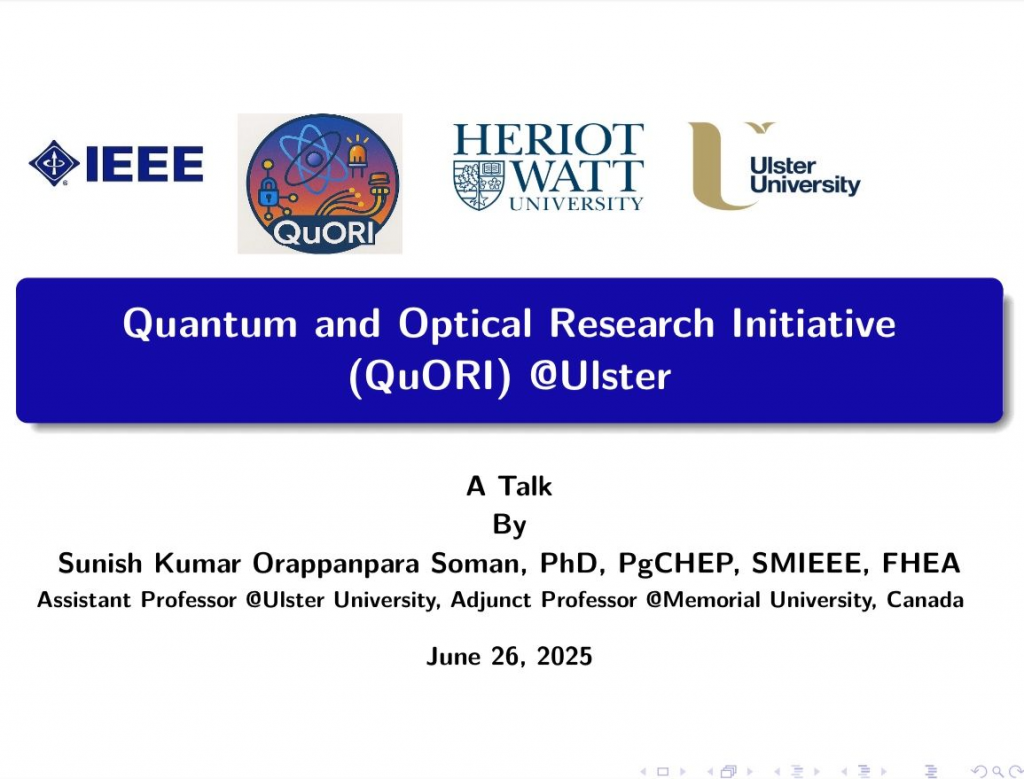Sunish Kumar Orappanpara Soman, PhD, PgCHEP, SMIEEE, FHEA | Assistant Professor, Ulster University, Jordanstown, Northern Ireland, U.K.
Date: 27 June 2025


Talk Summary: In this invited talk, I will present recent research advances and ongoing initiatives at Ulster University, including the newly launched “Quantum and Optical Research Initiative (QuORI)” to drive innovation in quantum technologies, advance optical science, and foster interdisciplinary collaboration across academia and industry. I will also highlight our ongoing research in three key domains of modern communications: optical, wireless, and quantum systems.
We begin by highlighting our work in optical communications, which remains a backbone of long-haul information transfer. The widespread deployment of silica-based standard singlemode optical fibers has led to transformative changes across the global communication infrastructure. However, these systems face fundamental limitations due to linear impairments such as attenuation and chromatic dispersion, and more critically, the Kerr nonlinearity, a nonlinear phenomenon that introduces signal distortions dependent on the optical power. To address these challenges, we explore digital signal processing (DSP) techniques for Kerr nonlinearity compensation, with a particular emphasis on perturbation theory-based methods. These approaches are gaining traction in the industry due to their lower computational complexity compared to conventional techniques. Furthermore, we introduce our recent developments in model-based deep learning architectures, which integrate perturbation theory with neural networks to effectively mitigate nonlinear fiber impairments.
Transitioning to the wireless domain, we address the pressing intersection of sustainability and next-generation communication technologies. In light of climate change and the increasing demand for renewable energy sources such a geothermal, we have proposed a generalized geothermal sensing and monitoring (GeoSM) model that utilizes the 6G-enabled integrated sensing and communication (ISAC) technology. We will present the envisioned system architecture, enabling technologies, and a case study focusing on waveform optimization for GeoSM applications, thereby showcasing the dual role of 6G in both connectivity and environmental monitoring.
Lastly, we discuss our recent work in the field of quantum communications, where we focus on the modeling and optimization of future quantum communication networks (QCNs) and the broader quantum Internet (QI). Addressing the computational bottlenecks associated with simulating open quantum systems using the Lindblad master equation, we propose a novel, physics-informed neural network (PINN)-based framework. This approach embeds quantum dynamics directly into the learning process, enabling scalable and efficient modelling of quantum entanglement behaviour under realistic noise conditions. Preliminary simulations of Bell-state fidelity decay under energy damping and phase noise demonstrate the promise of PINNs in accelerating quantum network analysis and optimization.
In conclusion, this talk will showcase how Ulster University is contributing to cutting-edge research that spans the physical-layer challenges of optical fiber communication systems, the environmental and sustainability-driven innovations in 6G-wireless systems, and the foundational modelling of QCN for the future QI.
Speaker Bio: Dr. Sunish Kumar Orappanpara Soman received the B.Tech degree in electronics and communications engineering from the Cochin University of Science and Technology, Kochi, India, in 2005, the M.B.A. degree in human resource management and finance from Kerala University, Thiruvananthapuram, India, in 2010, the M.Tech degree in optoelectronics and communication systems from the Cochin University of Science and Technology in 2013, and the Ph.D. degree in computer engineering from the Memorial University of Newfoundland, St. John’s, NL, Canada, in 2020. From 2012 to 2013, he was a Project Assistant with the Indian Institute of Science, Bengaluru, India. From 2020 to 2021, he was a Postdoctoral Research Fellow with the University of British Columbia, Vancouver, BC, Canada.
In 2021, he joined the Ulster University, Jordanstown, Northern Ireland, U.K., as a Lecturer (Assistant Professor) of electronics and software engineering. Currently, he is also working as an Adjunct Professor in the Department of Electrical and Computer Engineering, the Memorial University of Newfoundland, Canada and served as an International Faculty at the Ulster College, Shaanxi University of Science and Technology, Xi’an, China. He has authored or co-authored many reputed journal papers and flagship conference proceedings in the area of wireless/optical communications, machine learning, and quantum information and communications.
He is serving as a reviewer for various reputed journals such as IEEE Communications Surveys and Tutorials, IEEE/Optica Journal of Lightwave Technology, IEEE Transactions on Network Science and Engineering, IEEE Transactions on Cognitive Communications and Networking, IEEE Transactions on Intelligent Transportation Systems, IEEE Internet of Things Journal, IEEE Transactions on Green Communications and Networking, IEEE Open Journal of the Communications Society, IEEE Sensors Journal, IEEE Communications Letters, IEEE Photonics Technology Letters, IEEE Photonics Journal, IEEE Access, IEEE Wireless Communications Magazine, and IEEE Communications Standards Magazine. He is also serving as an associate editor for the IEEE Open Journal of the Communications Society (OJ-COMS) under the research area Optical Communications and Networks. He has received several research grants, including the Research Impact Fund (internal, Principal Investigator), funding from the Garfield Weston Trust (Co-Investigator), an EPSRC Core Equipment Award (Co-Investigator), the Research Recovery Fund (internal, Principal Investigator), and the Royal Society Partnership Grant (STEM Partner).
His research interests encompass quantum information and communication systems, wireless and optical communications engineering, as well as the application of machine learning techniques across diverse areas within communications engineering. He was the recipient of the Babasaheb Dr. Ambedkar Fellowship National Award, 2011, from India, the Hira-Kamal Ahuja International Graduate Fellowship Award (Ahuja Fellow), 2015, and the Fellow of the School of Graduate Studies Award, 2020, at Memorial University, Canada.
